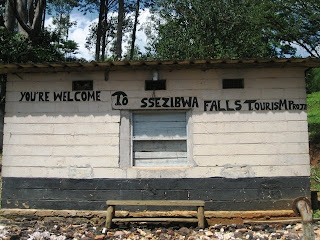 I finally took a tour of the sugarcane factory that I pass everyday.
I finally took a tour of the sugarcane factory that I pass everyday. 



 I visited my host sister's school and taught her kids the "Sunbeam" song- they loved it!
I visited my host sister's school and taught her kids the "Sunbeam" song- they loved it!I remember pulling into the bus station in Bangkok and seeing them. They were lined up on the street, wrapped in beads, hemp, sarongs, Chaco straps, nylon packs, unwashed sun bleached hair and a casual confidence of independence. They were backpackers. At that moment I wished to be disconnected from my mixed conservative, pre-planned group and to flirt, roam and LIVE as they do. I vowed that I would learn their style and travel as they.
Throughout the next few years I did end up in the same places and even adopted an air of backpacker style, but what I didn’t know then and what I would eventually discover is that I never really would become one of them. Maybe it has to do with the fact that I can’t enjoy many of the uninhibited activities that dominate the culture. But, in honest analysis I think I have to admit that I am horrible long-term leisure traveler. The chemical that allows your brain to decide to wake up everyday and choose what you are going to do to gain the utmost personal enjoyment for months and months is not found in my genetics. Instead, I like to get in, get deep, and come out with my hands dirty- working alongside the people in the place to find out their unique quirks. And only until I think the scale will break on the heavy side of exhaustion do I feel worthy to take a rest.
So here I am, I have finished my internship, I am staying in a hostel so tuned up for backpackers, that it is literally called “Backpackers”. I am now suppose to align myself and follow in line with them. But I am restless, I feel like I am not one of them. I have a home here and there is still work to do. I am not done with Uganda. I am finding it challenging to go from caring about if Naigaga Agnes will be able to cover the remaining $20 of her school fee balance to caring about where I can get the best wireless for Face book. I use to think exploring was the pursuit of physical adventure and seeing the sites. But somehow in the thick of Uganda, the definition of adventure came to be finding the power to work among others while being different, finding a way to make an impact with unexpected variables. The exploring seems to be far more internal and related to people than geographical.
I didn’t know it would be like this or I would have acted accordingly, I didn’t know that I would be choked up and paralyzed. I am lucky though, I have a dear friend coming to travel who is willing to allow me one more day of work in hopes of closure before we line up and march on.
Today is hello Chris, soon to be good bye Uganda.









































 (Annette cooking dinner at the house on a standard characoal stove)
(Annette cooking dinner at the house on a standard characoal stove)


